The Mainstream Phoenix Rises: Samsung's 970 EVO (500GB & 1TB) SSDs Reviewed
by Billy Tallis on April 24, 2018 10:00 AM ESTAnandTech Storage Bench - Light
Our Light storage test has relatively more sequential accesses and lower queue depths than The Destroyer or the Heavy test, and it's by far the shortest test overall. It's based largely on applications that aren't highly dependent on storage performance, so this is a test more of application launch times and file load times. This test can be seen as the sum of all the little delays in daily usage, but with the idle times trimmed to 25ms it takes less than half an hour to run. Details of the Light test can be found here. As with the ATSB Heavy test, this test is run with the drive both freshly erased and empty, and after filling the drive with sequential writes.
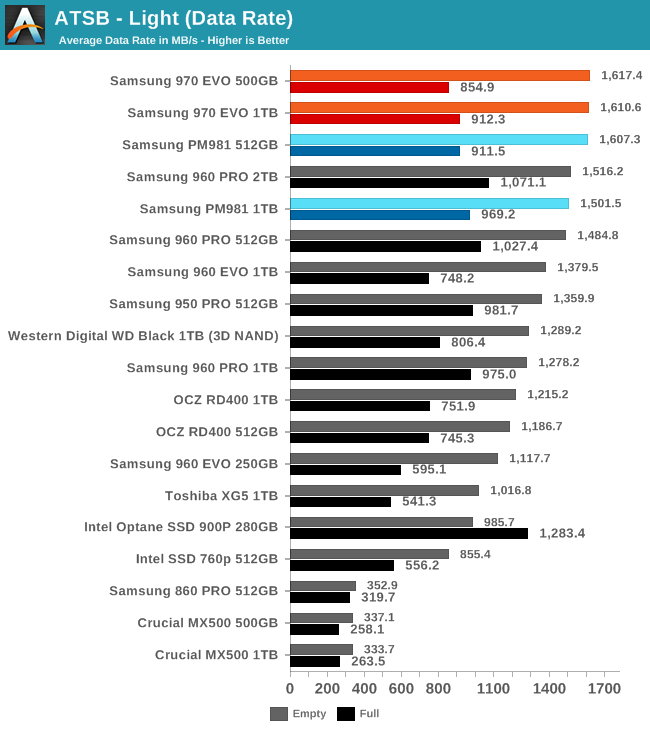
The peak performance of the Samsung 970 EVO on our Light test is record-setting, but that's only an improvement of 6% over the Samsung 960 PRO's average data rate—not a big enough difference to notice on such a light workload. When the test is run on a full drive, the 970 EVO loses more performance than most top drives, because it is one of the few TLC-based drives in that tier.
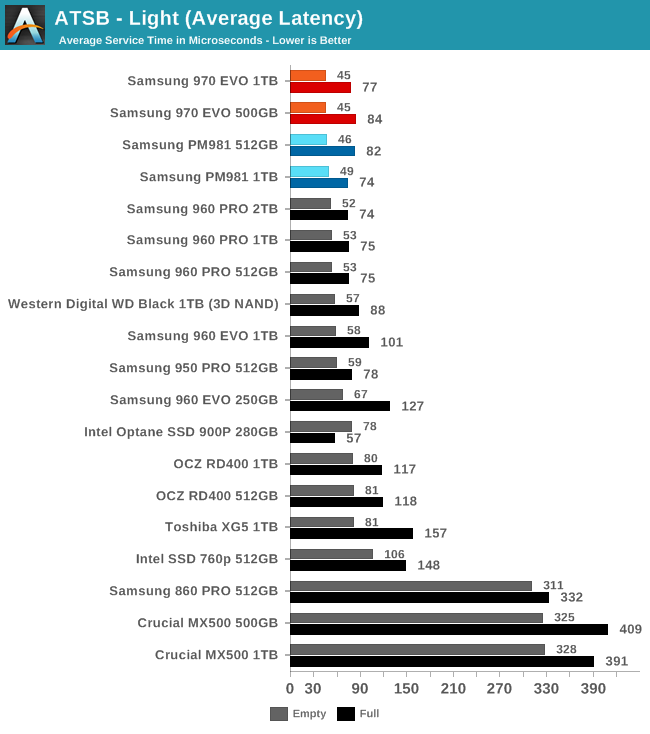
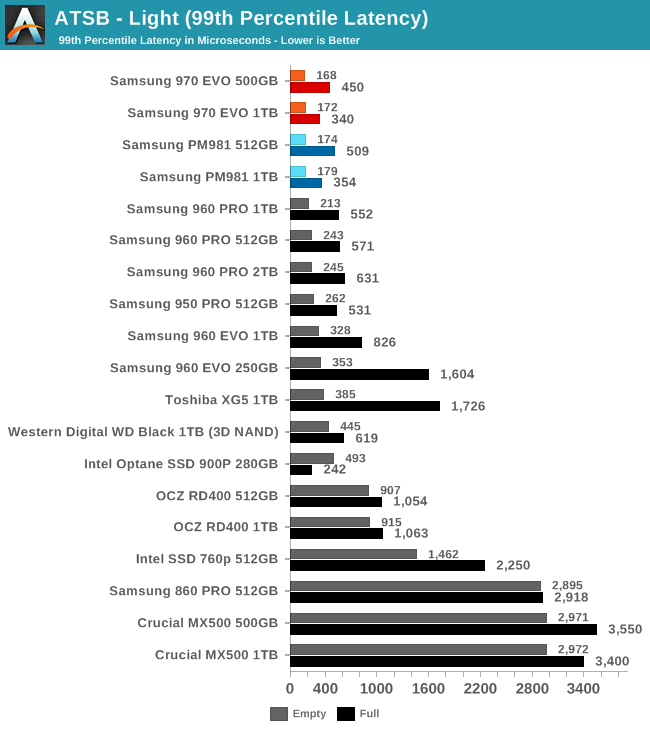
The average and 99th percentile latencies from the 970 EVO on the Light test are some of the best we've measured, still represent tiny improvements over Samsung's previous high-end SSDs.
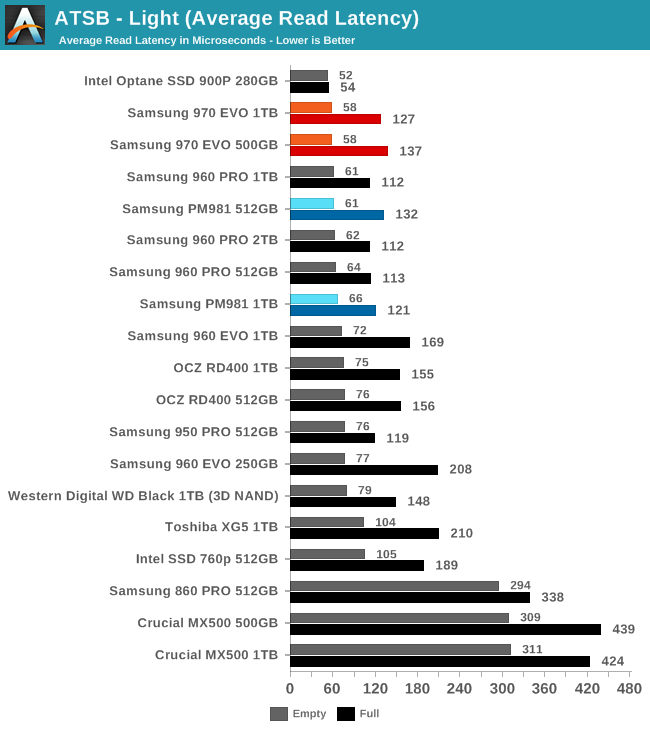
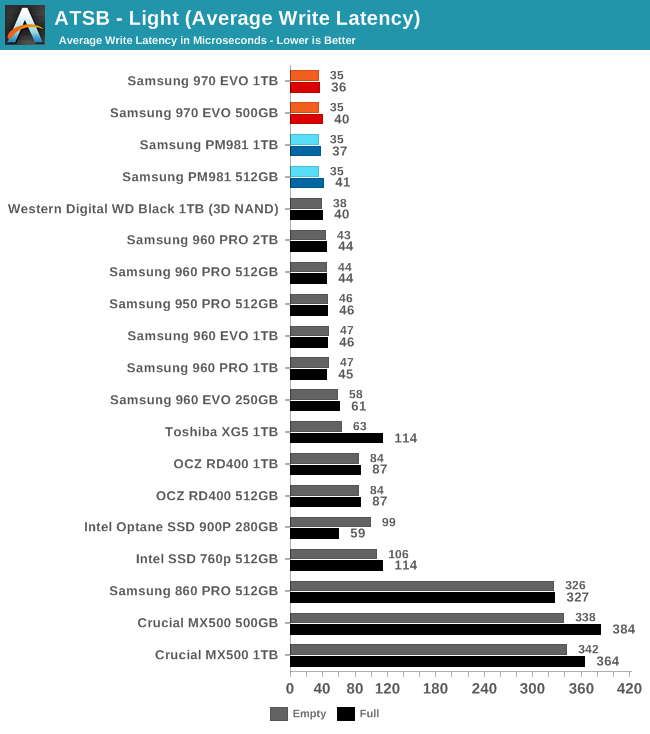
The Samsung 970 EVO leads over other flash-based SSDs for both average read and write latency, but the differences are just a few microseconds and thus completely imperceptible.
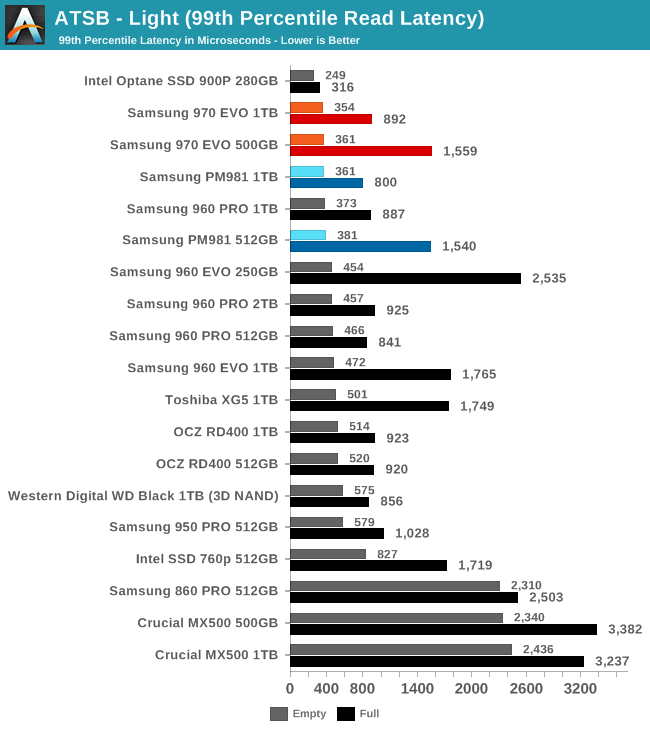
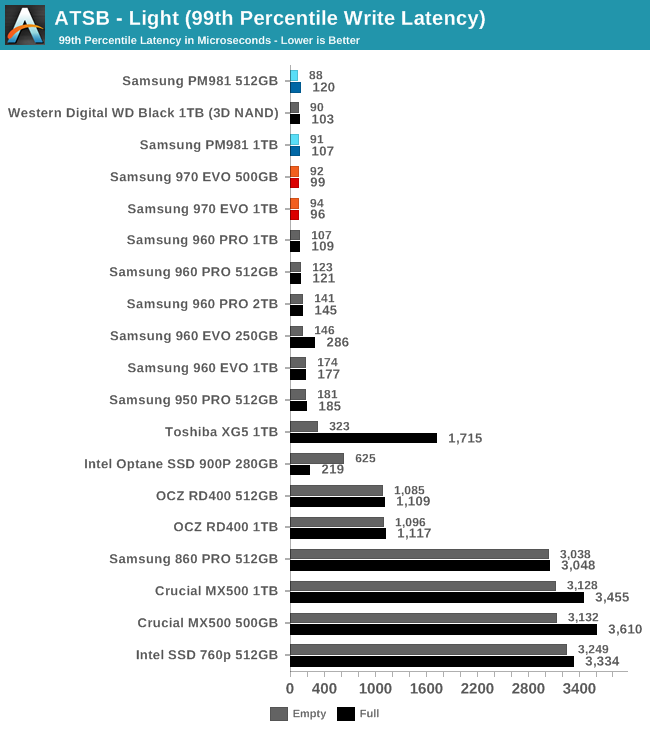
The Samsung 970 EVO is the first drive to keep its 99th percentile write latency below 100µs whether or not the Light test is run on a full drive, showing that the 4-6GB static SLC cache is still quite useful even when the dynamically sized portion of the cache is unavailable. The 99th percentile read latency shows that Samsung has improved their full-drive QoS over the 960 EVO, but for the 500GB model in particular they still have room for improvement.
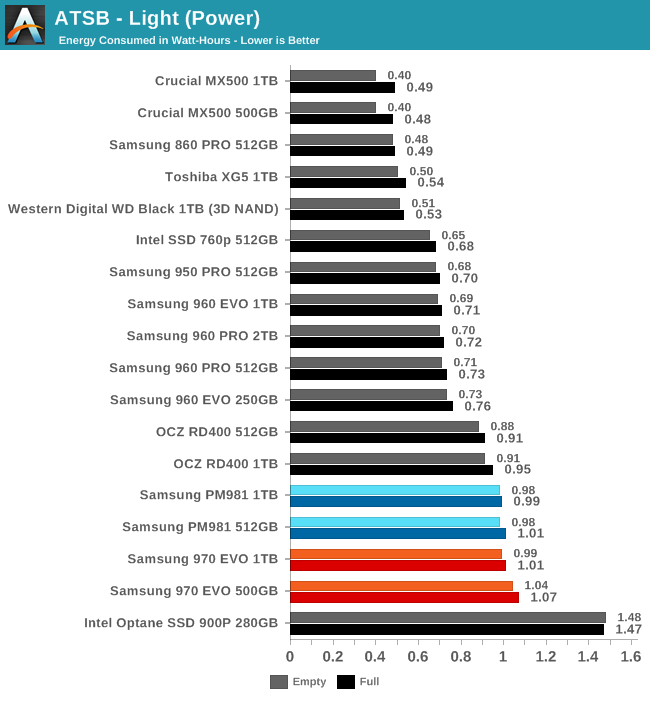
The energy usage of the Samsung 970 EVO is slightly higher than the PM981, putting the 970 EVO in last place for efficiency among flash-based SSDs. The energy usage of the 970 EVO doesn't show much variation between running the test on a full vs empty drive, despite the large performance differences between those scenarios.










68 Comments
View All Comments
cfenton - Tuesday, April 24, 2018 - link
I've been meaning to ask about this for a while, but why do you order the performance charts based on the 'empty' results? In most of my systems, the SSD's are ~70% full most of the time. Does performance only degrade significantly if they are 100% full? If not, it seems to me that the 'full' results would be more representative of the performance most users will see.Billy Tallis - Tuesday, April 24, 2018 - link
At 70% full you're generally going to get performance closer to fresh out of the box than to 100% full. Performance drops steeply as the last bits of space are used up. At 70% full, you probably still have the full dynamic SLC cache size usable, and there's plenty of room for garbage collection and wear leveling.When it comes to manual overprovisioning to prevent full-drive performance degradation, I don't think I've ever seen someone recommend reserving more than 25% of the drive's usable space unless you're trying to abuse a consumer drive with a very heavy enterprise workload.
cfenton - Tuesday, April 24, 2018 - link
Thanks for the reply. That's really helpful to know. I didn't even think about the dynamic SLC cache.imaheadcase - Tuesday, April 24, 2018 - link
So im wondering, i got a small 8TB server i use for media/backup. While i know im limited to network bandwidth, would replacing the drives with ssd make any impact at all?Billy Tallis - Tuesday, April 24, 2018 - link
It would be quieter and use less power. For media archiving over GbE, the sequential performance of mechanical drives is adequate. Incremental backups may make more random accesses, and retrieving a subset of data from your backup archive can definitely benefit from solid state performance, but it's probably not something you do often enough for it to matter.Even with the large pile of SSDs I have on hand, my personal machines still back up to a home server with mechanical drives in RAID.
gigahertz20 - Tuesday, April 24, 2018 - link
@Billy Tallis Just out of curiosity, what backup software are you using?enzotiger - Tuesday, April 24, 2018 - link
With the exception of sequential write, there are some significant gap between your numbers and Samsung's spec. Any clue?anactoraaron - Tuesday, April 24, 2018 - link
Honest question here. Which of these tests do more than just test the SLC cache? That's a big thing to test, as some of these other drives are MLC and won't slow down when used beyond any SLC caching.RamGuy239 - Tuesday, April 24, 2018 - link
So these are sold and markedet with IEEE1667 / Microsoft edrive from the get-go, unlike Samsung 960 EVO and Pro that had this promised only to get it at the end of their life-cycles (the latest firmware update).That's good and old. But does it really work? The current implementation on the Samsung 960 EVO and Pro has a major issue, it doesn't work when the disk is used as a boot drive. Samsung keeps claiming this is due to a NVMe module bug in most UEFI firmware's and will require motherboard manufactures to provide a UEFI firmware update including a fix.
Whether this is indeed true or not is hard for me to say, but that's what Samsung themselves claims over at their own support forums.
All I know is that I can't get neither my Samsung 960 EVO 1TB, or my Samsung 960 Pro 1TB to use hardware encryption with BitLocker on Windows 10 when its used as a boot drive on neither my Asus Maximus IX Apex or my Asus Maximus X Apex both running the latest BIOS/UEFI firmware update.
When used as a secondary drive hardware encryption works as intended.
With this whole mess around BitLocker/IEEE1667/Microsoft Edrive on the Samsung 960 EVO and Pro how does it all fare with these new ones? Is it all indeed a issue with NVMe and most UEFI firmware's requiring new UEFI firmware's with fixes from motherboard manufactures or does the 970 EVO and Pro suddenly work with BitLocker as a boot drive without new UEFI firmware releases?
Palorim12 - Tuesday, April 24, 2018 - link
Seems to be an issue with the BIOS chipset manufacturers like Megatrends, Phoenix, etc, and Samsung has stated they are working with them to resolve the issue.